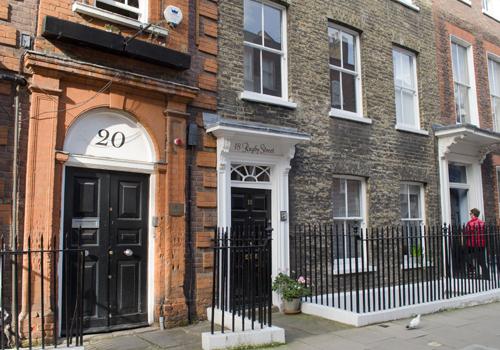The Xtra Diary: House to let – struggling poets need not apply…
To Let board goes up at address made famous by Ted Hughes and Sylvia Plath
Monday, 28th November 2016 — By The Xtra Diary

18 Rugby Street Pic: Alison Day
SO there in Number Eighteen Rugby Street’s Victorian torpor and squalor I waited for you.”
So begins Ted Hughes’ poem about the small Bloomsbury house he lived in during the 1950s, where the American poet Sylvia Plath first visited him, and the role it played in their lives together.
“18 Rugby Street” appeared in Hughes’ Birthday Letters, a volume of poems published a few months before Hughes’ death that shed light on his passionate and troubled relationship with Plath, and his response to her suicide aged just 30.
The former poet laureate writes in the poem of the house’s “unlit and unlovely lavatory”, its lack of running water and how its four floors acted as a stage set for its occupants and played host to “an unmysterious laboratory of amours”.

Ted Hughes and Sylvia Plath
But today an estate agent’s board, standing conspicuously outside the front of the Georgian townhouse, signals that the famous lodgings are available to rent.
Property agents Farebrother will no doubt be inundated with viewing requests from curious fans of the star poets, hoping for a glimpse inside a home steeped in literary history.
Local photographer Bobby Williams, himself a former resident at number 18, has documented the rich history of the house and in 2013 exhibited a series of portraits of its tenants.
His project gives fascinating insight into the house’s former residents, which also included poet Daniel Huws, actor Peter O’Toole and influential graphic designer Richard Hollis.
As part of the project he made recordings, including one of Hollis recalling his time living with Hughes and Plath in their pale grey flat. “Sometimes I would sit talking, particularly to Sylvia, who was very much a sort of homebody. I didn’t think of her particularity as a writer, let alone a poet. She used to sit doing domestic things, sewing and so on.”
The low rents of the lodgings at the heart of Bloomsbury’s celebrated cultural centre meant number 18 attracted a wealth of creative talent for decades. Until recently the house remained remarkably unchanged, but according to Williams the golden era has now come to an end. He wrote in 2013 that the house’s owner has now updated the quirky old lodgings to command higher rents.
Perhaps an inquisitive student or two might put on their best suits and masquerade as well-heeled tenants but, with its inevitable facelift, this prime Bloomsbury dwelling is unlikely to be the backdrop for the trysts of future struggling poets.